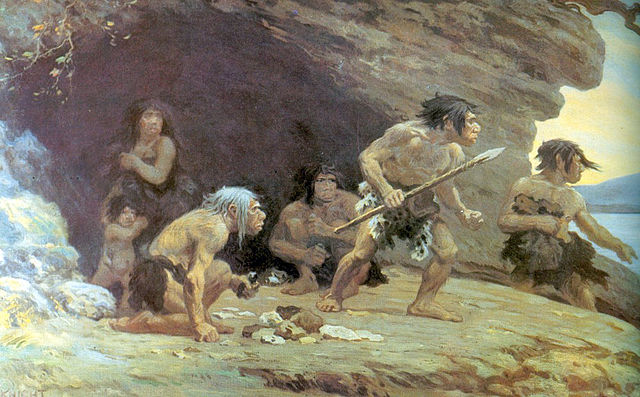
It makes no sense that God would have created both Homo Sapiens and Neanderthals. So an explanation for the creation of the Neanderthals must be sought elsewhere. We now know that the Neanderthals were an entirely different species of human. They differed from Homo Sapiens both genetically and in appearance.
The Neanderthals were shorter and stockier than Homo Sapiens, who are lighter in build. If humans were compared to horses, the Neanderthals would be the cart horses and the Homo Sapiens would be the race horses. The build of the Neanderthals seems to suggest that the Neanderthals were built for labour.
I have wondered for some time now if the Epic of Atrahasis describes the creation of the Neanderthals.
The Epic of Atrahasis is a story from ancient Mesopotamia which describes how the Sumerian ‘gods’ created a man to do their work for them after a rebellion by the lower gods who were doing all the work. Neanderthal remains have been found in the geographical area that was ancient Mesopotamian. The partial remains of 10 Neanderthal men, women and children were found during excavations in the 1950s and 1960s in the Shanidar Cave in Iraq.
The Sumerian gods were all fallen angels and the Epic of Atrahasis reveals them as such. They used baptism to cleanse themselves from their sin of killing an angel to create a man:
[205] and said to the great gods:
“On the first, seventh, and fifteenth days of the month,
let me establish a purification, a bath.
Let one god be slaughtered,
then let the gods be cleansed by immersion.
It must remembered that before Jesus became a man He was the Angel of Yahweh, the Holy Spirit. When He healed the blind man in the Gospel of John He spat on the ground and made mud:
6 After saying this, he spit on the ground, made some mud with the saliva, and put it on the man’s eyes.
John 9:6 NIV
In the Epic of Atrahasis the fallen angels spit on the clay in the same way that Jesus spat on the mud:
[230] Lest he be allowed to be forgotten, the spirit remained.
After she had mixed the clay,
she summoned the Anunna, the great gods.
The Igigi, the great gods, spat upon the clay.
There is no doubt in my mind that the ‘great gods’ are a group of fallen angels and that angels can use their spit to create. Jesus seems to have created a new pair of eyes for the blind man in John 9:6 and the fallen angels in the Epic of Atrahasis used their spit when creating a body.
It is clear from the Epic of Atrahasis that the man that is being created is not the first man in existence because the fallen angels mix the flesh and blood of the angel that they slaughter with a man:
[225] Nintu mixed clay with his flesh and blood.
That same god and man were thoroughly mixed in the clay.
For the rest of the time they would hear the drum.
From the flesh of the god the spirit remained.
It would make the living know its sign.
The result is a new kind of man who the fallen angels use to do their labour:
235] Mami made rady to speak,
and said to the great gods:
“You ordered me the task and I have completed it!
You have slaughtered the god, along with his inspiration.[240] I have done away with your heavy forced labor,
I have imposed your drudgery on man.
You have bestowed clamor upon mankind.
I have released the yoke, I have made restoration.”
They heard this speech of hers,[245] they ran, free of care, and kissed her feet, saying:
“Formerly we used to call you Mami,
now let your name be Belet-kala-ili:”
If the Neanderthals were created by the fallen angels of Mesopotamia as slave labourers it must have been the flood that freed them from the fallen angels and allowed them to escape northwards into Europe. Therefore, the flood served more than one purpose. It wiped sin from the face of the earth and also freed a slave race from their evil masters.
Bibliography:
Livius.org: Articles on Ancient History: The Epic of Atrahasis https://www.livius.org/sources/content/anet/104-106-the-epic-of-atrahasis/